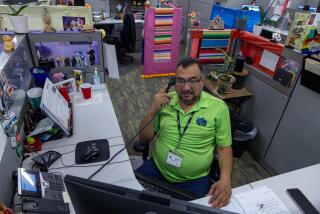A True Test of Your Strengths
- Share via
No job change looks appealing when you’re depressed, Ivan learns. Taking your emotional temperature and getting a handle on your temperament can bring the knowledge needed to make a wise career choice. Los Angeles-based counselors Kathy Marshall and Ann Salzman explain to Ivan how vocational testing works. For a quiz to determine whether you’re in the right job for you, see page 29.
Ivan Hunter, looking puzzled, stood on his front porch holding the Yellow Pages. Seeing his neighbor, Barbara, walk past, he called her name and waved for her to come up. “How’s it going?” she asked, setting down a bag of groceries at the foot of the steps.
“I finally found guidance counselors under ‘Career & Vocational Counseling,’ ” Ivan frowned. “Now I need to talk with a few of them to get a clearer idea of what a guidance counselor actually does. There must be 40 listings here, though, so who do I call first?”
“I’ve never worked with any of these people myself,” she said, glancing at her watch, “but I’ve heard that the JVS Assessment Center of Los Angeles is fairly representative of the larger agencies.” Giving him a thumbs-up, Barbara grabbed her groceries and hurried off.
Ivan’s call was answered by Kathy Marshall, supervisor of the assessment program, and his timing couldn’t have been better. Kathy was in the middle of relocating and up to her chin in boxes. Since the movers hadn’t arrived yet, she said that she’d be happy to answer his questions while she waited. Knowing that they might be interrupted at any moment, Ivan got right to the point. “What are the benefits of having an assessment done before I choose a training program or start looking for a job?”
“The obvious benefit, of course, is an assessment will give you an accurate picture of your current skills and potentials so you don’t over- or underestimate your abilities. Equally important, an assessment will help you keep up with the rapidly changing labor market. A large part of an assessment is matching your interests and abilities to both the jobs of today and the jobs of the future.”
“What kind of services do you provide?”
“JVS is a comprehensive agency. We test and assess interests, abilities and potentials, and offer a variety of job counseling and placement services. The testing can take from three to 10 days, and the follow-up continues until you get a job.”
“What kinds of tests do you use?”
“We offer interest surveys, reading and math skill-level assessments, aptitude assessments, computer and general office skills testing, and physical dexterity and capacity assessments. We also use behavior observation to get a fuller picture of the individual’s work style and approach to tasks, instead of just relying on test results to describe the person.”
“How much do your services cost?”
“Assessments cost $150 per day, the job placement fee is $45 for access to job leads for three months, and the fee for one-on-one assistance with job searches, job development and interviewing skills is $750. That isn’t due until the person has worked for 60 days, to make sure that the job is really a match.”
“Thank you, Kathy,” Ivan said, “I really appreciate your taking the time to talk with me. Have a good . . . er . . . move.”
“You’re very welcome,” Kathy chuckled, “and thank you for calling.”
To get an idea of what someone in private practice could do for him, Ivan next chose a name at random and called Anne Salzman, a Los Angeles-based licensed psychologist. After explaining why he was calling, Ivan asked her what kind of services she provided and how much she charged.
“I do a combination of psychological and vocational tests,” Anne said, her enthusiasm for her work bringing an envious smile to Ivan’s face. “These include an IQ test to determine what kind of intellectual processes the person uses most effectively, tests to identify interests and abilities, and a series of psychological personality tests. Then I discuss the results with the person and identify the industries and career paths that are realistically suitable as well as offer the greatest potential job satisfaction. The testing takes about six hours, which I do in three sessions because it’s quite intense, and the counseling session lasts for an hour or two, or until we’ve covered everything. The fee is $500 and it’s a pay-as-you-go kind of thing, so you can schedule these sessions to suit your budget.”
“Thank you, Anne,” Ivan said, “you’ve been very helpful. Before I hang up, though, is there anything I haven’t asked you that I should have?”
“What are the benefits of going to a psychologist for a vocational assessment?” Anne replied, and then answered her own question. “A lot of people, particularly those who’ve lost their jobs, are depressed when they start looking around for a new career. And that’s not a good time, because nothing is interesting or exciting when you’re depressed. A psychologist would be able to recognize the symptoms quickly and help you work through the depression first, to make sure that you choose your new career from interest and not exhaustion.”
Thanking Anne again, Ivan put down the phone and went to the kitchen for a cup of coffee. He returned a few minutes later to find his sister, Irma, reading his notes.
“If you’re checking out guidance counselors,” Irma mused, chewing on a fingernail, “you should call Laura. You remember Laura, don’t you, my roommate in college? She’s a psychologist now and she specializes in vocational assessments.”
Remembering her well, Ivan dialed Laura’s number and smiled when her gruff but friendly voice came on the line. Again he explained his mission and asked his questions. Ten minutes later, deciding that he’d feel more comfortable working with someone he knew, he made an appointment for the next afternoon.
Feeling strangely nervous, Ivan met with Laura the following week to review his test results. “No wonder you’ve been unhappy,” she said. “For someone with your interests and abilities, ‘pharmacist’ is as wrong a career for you as I could possibly imagine. What you need is outdoor work, near water, using your hands. What you should be doing, in other words, is designing and building surfboards.”
“Surfboards,” he nodded, pleased to have his daydreams validated. “All right!” he shouted, “where do I start?”
“By getting a counter job at a surf shop that makes and sells its own boards. Here,” she said, handing him a card, “call this employment agency. Their specialty is placing people in retail positions.”


